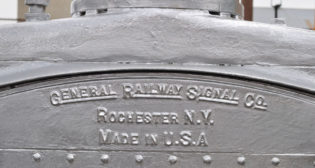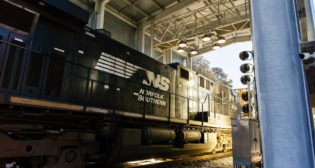
If you get a good deal, take it
Written by Frank N. Wilner, Capitol Hill Contributing EditorWatching Washington, November 2017: Almost three years since 12 rail labor unions commenced collective bargaining over wages, benefits and work rules with Class I railroads, plus many regionals and short lines, a coalition of six unions—representing some 60% of the 145,000 affected workers—has reached a tentative agreement with the carriers.
Should it fail membership ratification, a Donald J. Trump-appointed, and presumably management-friendly, Presidential Emergency Board (PEB) will make non-binding recommendations for settlement.
Absent a ratified agreement in place to serve as a pattern, all original carrier demands—lower wage increases, no retroactive pay, more healthcare givebacks, expansion of remote control use, elimination of road and yard distinctions, and scrapping of extra boards—are back in play, and a PEB likely will cotton to some.
Should labor decline to settle as recommended by a PEB, the door opens for an anti-labor congressional majority to do what lawmakers typically do to end a national rail work stoppage—impose the PEB recommendations.
This ain’t a trick bag in which rail workers wish to find themselves. While collective bargaining never delivers to either side all it wants, political realities and a problematic economic climate for railroads make this tentative agreement look generous.
Indeed, in the midst of continued wage stagnation elsewhere in America, it puts at least $33,000 more into the pockets of the highest paid rail workers within just two years; and more than $16,000 by mid-2019 to those in the lower wage rungs. And there is not a single work rules change.
Although healthcare co-pays, deductibles and out-of-pocket maximums rise—but more slowly than medical cost inflation, and barely for those in good health—employee monthly insurance premiums are capped at the current level until at least mid-2020. By contrast, other private sector and federal workers—including congressional staff advising lawmakers if ratification fails—pay significantly more. In fact, railroads will be paying some 90% of all employee healthcare costs.
Motivation for a management-friendly PEB and anti-labor congressional majority to trim back this tentative deal, should ratification fail, is a 44% drop in the railroads’ bedrock coal traffic—a $7 billion revenue hit—further shadowed by problematic prospects given the growth of natural gas, solar and wind for electric power generation. The bloom also is off intermodal, while many in Congress support allowing longer and heavier rail-competitive trucks.
Inexplicably and anarchist-like, leaders of the Brotherhood of Maintenance of Way Employes (BMWE), which abandoned its own effort to negotiate a new contract, have urged rejection of this tentative agreement negotiated by the six unions representing conductors, engineers, signalmen and some shopcraft workers.
Equally perplexing, the BMWE’s distribution of leaflets at work sites, and similar negative comments on social media, violate a core principle of trade unionism that forbids attacking another labor organization’s performance of its negotiating obligations. Were the BMWE affiliated with the AFL-CIO, the mainstream umbrella organization for most American labor unions, it would face severe sanctions.
Rejection of the tentative pact virtually assures that Congress will impose a new contract with an anti-labor tilt. The BMWE’s attempted sabotage is irrational, but irrationality has stained previous BMWE thinking.
BMWE members twice unlawfully occupied National Mediation Board offices to protest a preference for peaceful outcomes. BMWE has threatened to shut down Amtrak’s Northeast Corridor despite warnings that a perpetually underfunded Amtrak wouldn’t survive to reopen. And after frequently engaging in unlawful work stoppages against BNSF, BMWE is under unprecedented court order—with risk of its bank account being reduced to pocket change—to seek court permission for a future strike.
If there were a better deal out there, other labor organizations would have grabbed it. As for rejection, the probability of squeezing out a better offer is near nil. Most likely, should a PEB and Congress write the contract, is a three card Monte game rigged decidedly in favor of the carriers. Labor always is best served by the motto, “When you get a good deal, take it.”
The six unions with the tentative agreement are the American Train Dispatchers Association; Brotherhood of Locomotive Engineers and Trainmen; Brotherhood of Railroad Signalmen; International Brotherhood of Boilermakers, Iron Ship Builders, Forgers and Helpers; Sheet Metal, Air, Rail and Transportation Workers-Transportation Division (including yardmasters), and National Conference of Firemen and Oilers.



